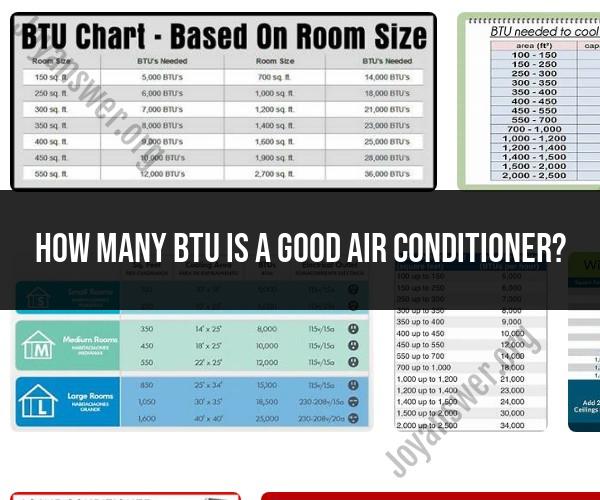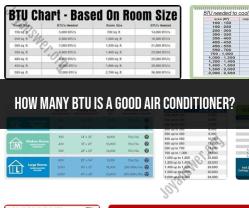How many BTU is a good air conditioner?
The appropriate BTU rating for an air conditioner depends on several factors, primarily the size of the area you want to cool, the climate in your region, and other considerations like insulation and heat sources. Here are some general guidelines to help you determine what BTU rating makes a good air conditioner for your needs:
Room Size: The most critical factor in choosing the right BTU rating is the size of the room or space you want to cool. In general, the larger the room, the higher the BTU rating required. Here's a rough guideline based on room size:
- Small Rooms (100-300 sq. ft.): 5,000-7,000 BTUs
- Medium Rooms (300-550 sq. ft.): 8,000-12,000 BTUs
- Large Rooms (550-1,000 sq. ft.): 12,000-18,000 BTUs
- Very Large Rooms (1,000+ sq. ft.): 18,000+ BTUs
Climate Zone: The climate in your region also plays a significant role. Hotter climates generally require air conditioners with higher BTU ratings to effectively cool the space. Conversely, cooler climates may require lower BTU ratings. Adjust the BTU rating based on your specific climate:
- Hot Climate (Southern U.S.): Add 20-30 BTUs per square foot.
- Moderate Climate (Central U.S.): Use 15-20 BTUs per square foot.
- Cool Climate (Northern U.S.): Use 12-15 BTUs per square foot.
Insulation and Other Factors: Consider the insulation in the room. Well-insulated rooms may require less cooling capacity, while poorly insulated rooms may need more. Also, factors like shading, sunlight exposure, and the number of occupants can affect the BTU requirement.
Energy Efficiency: It's important to balance cooling power (BTUs) with energy efficiency. Oversizing your air conditioner can result in short cycling (frequent on/off cycles) and reduced efficiency. Undersizing can lead to inadequate cooling. Aim for a balance that matches your specific needs.
Consult with an HVAC Professional: If you have a unique situation or if you're unsure about the right BTU rating for your air conditioner, it's a good idea to consult with a professional HVAC technician. They can perform a heat load calculation to determine the exact cooling requirements for your space.
In summary, the "good" BTU rating for an air conditioner is one that aligns with the size of the space you need to cool, your climate zone, insulation quality, and other factors. Following the general guidelines provided above should help you choose an air conditioner with an appropriate BTU rating for your comfort and energy efficiency needs.
Choosing the Right BTU Rating for Your Air Conditioner
The British Thermal Unit (BTU) rating of an air conditioner measures how much heat it can remove from a room in one hour. The higher the BTU rating, the more powerful the air conditioner. When choosing an air conditioner, it is important to select the right BTU rating for your needs. If you choose an air conditioner that is too small, it will not be able to cool your room effectively. If you choose an air conditioner that is too large, it will be more expensive to operate and may not be as efficient.
To choose the right BTU rating for your air conditioner, you need to consider the following factors:
- Square footage of the room: The larger the room, the more BTUs you will need.
- Number of windows: Windows let in sunlight and heat, so you will need more BTUs if your room has a lot of windows.
- Insulation: Good insulation will help keep your room cool, so you will need fewer BTUs if your room is well-insulated.
- Climate: If you live in a hot climate, you will need more BTUs than if you live in a cooler climate.
Once you have considered all of these factors, you can use the following formula to calculate your air conditioner's BTU needs:
BTU needed = Square footage of room x 25
For example, if your room is 200 square feet, you would need an air conditioner with a BTU rating of 5,000.
Cooling Power: Determining the Ideal BTU for Your AC
The ideal BTU rating for your air conditioner will also depend on your personal comfort preferences. Some people prefer a cooler room, while others prefer a warmer room. If you are not sure how much cooling you need, it is always better to err on the side of caution and choose a slightly larger air conditioner. You can always adjust the thermostat to achieve your desired comfort level.
Here are some additional tips for determining the ideal BTU for your air conditioner:
- Consider the number of people who will be using the room. More people will generate more heat, so you will need more BTUs to cool the room.
- Consider the type of appliances and electronics that will be used in the room. Appliances and electronics generate heat, so you will need more BTUs to cool the room if there are a lot of appliances and electronics present.
- Consider the time of year that you will be using the air conditioner. If you will be using the air conditioner during the hottest months of the year, you will need a more powerful air conditioner with a higher BTU rating.
BTU Sizing: Finding the Perfect Air Conditioner for Your Space
When sizing an air conditioner for your space, it is important to consider all of the factors that can affect cooling performance. This includes the square footage of the room, the number of windows and doors, the amount of insulation, and the climate.
If you are unsure of the correct size air conditioner for your space, it is best to consult with a professional HVAC contractor. They can help you assess your needs and select the right air conditioner for your budget and space.
Here are some additional tips for finding the perfect air conditioner for your space:
- Look for an air conditioner with an Energy Star rating. Energy Star-rated air conditioners are more efficient than standard models, which can save you money on your energy bills.
- Consider the type of air conditioner that is right for your needs. There are a variety of air conditioner types available, including window air conditioners, central air conditioners, and portable air conditioners.
- Choose an air conditioner that is the right size for your space. An air conditioner that is too small will not be able to cool your space effectively, while an air conditioner that is too large will be more expensive to operate and may not be as efficient.
By following these tips, you can choose the perfect air conditioner for your needs and space.


